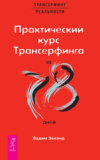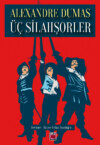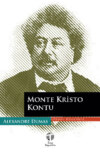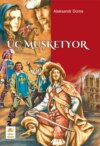Kitabı oku: «The Last Vendée», sayfa 42
XXVI.
MARCHES AND COUNTER-MARCHES
In spite of the adornment of wind-galls and spavin, with which age and toil had favored Maître Courtin's pony, that brave beast showed energy enough in the amble which served him for a trot to bring Michel into Nantes before nine o'clock at night. His first stopping-place was to be the tavern of the Point du Jour.
He had hardly crossed the pont Bousseau before he began to look about him for the said tavern. Recognizing its sign, – a star lengthened by a ray of the most beautiful yellow ochre painter ever used, – he stopped his pony, or rather the pony of Maître Courtin, before a wooden trough where the horses of the wagoners, who wanted to halt without unharnessing, were watered.
No one appeared at the door of the inn. Forgetting the humble clothes which he wore, and remembering only the alacrity with which the servants at La Logerie welcomed his arrival, Michel rapped impatiently on the trough with the heavy stick he held in his hand. At the sound a man in his shirt-sleeves came out of the courtyard and advanced to Michel; he wore on his head a blue cotton cap pulled down to his eyes. Michel fancied that what he saw of the face was not unknown to him.
"The devil!" cried the man in a grumbling tone; "are you too much of a lord, my young gars, to take your horse to the stable yourself? However, no matter; you shall be served as well as any."
"Serve me as you please, but answer a question."
"Ask it," said the man, folding his arms.
"I want to see Père Eustache," added Michel, sinking his voice.
Low as the tone was, the man showed signs of annoyance; he looked furtively about him, and though there was no one to be seen but a few children who were gazing with their hands behind their backs in naïve curiosity at the new-comer, he took the horse hastily by the bridle and led him into the courtyard.
"I told you I wanted to see Père Eustache," said Michel, getting off the pony as soon as the man in the blue cap had led him to the shed which served as stable to the hôtel Point du Jour.
"I know that," said the latter. "I heard it, confound you; but I don't keep your Père Eustache in my oat-bin. Besides, before I tell you where to find him I'd like to know where you come from."
"The South."
"Where are you going?"
"To Rosny."
"Very good; then you must go to the church of Saint-Sauveur, and there you will find the man you want. Go; and try not to speak so loud, Monsieur de la Logerie, when you talk in the street-if you want to gain the object of your journey."
"Ah, ha!" cried Michel, somewhat astonished; "so you know me?"
"I should think so!" said the man.
"I must have that horse taken back to its home."
"It shall be done."
Michel put a louis into the man's hand, who seemed delighted with the fee and made him many offers of service; then he boldly went out into the town. When he reached the church of Saint-Sauveur the sexton was in the act of shutting the gates. The lesson the young baron had just received at the gate of the inn bore fruits; Michel waited cautiously and looked about him before putting any questions.
Four or five beggars, before leaving the church porch, where they had asked alms all day of the faithful, were kneeling beneath the organ to say their evening prayer. No doubt Père Eustache was among them; for besides two or three women with their cotton capes, patched with various colors, thrown over their heads, there were three male beggars, each with a holy-water sprinkler in his hand. Either of the three might be the man Michel was in search of; luckily he knew the sign of recognition. He took the branch of holly that was fastened in his hat, which Bertha had told him was the sign by which Père Eustache would know him, and let it drop before the door. Two of the beggars passed without taking the least notice of it; the third, who was a little old man, thin and weakly, whose enormous nose projected boldly beyond a black silk cap, stopped when he saw the holly on the pavement, picked it up, and looked about him uneasily. Michel issued from behind the pillar which concealed him.
Père Eustache (for it was he) cast a sidelong look at the young man; then, without a word, he walked toward the cloister. Michel understood that the holly was not a sufficient sign to the distrustful giver of holy water; after following for about ten yards, he hastened his steps and accosted him, saying: -
"I am from the South."
The beggar stopped.
"Where are you going?" he asked.
"To Rosny," replied Michel.
The beggar turned round and retraced his steps; this time he went toward the town. A look from a corner of his eye told Michel it was all right. The latter then let his guide pass him and followed him at a distance of five or six paces. They returned past the portal of the church, and soon after, having entered a dark and narrow alley, the beggar stopped for a few seconds before a low door placed in the wall of a garden; then he continued his way.
Michel was about to follow him; but the beggar made him a sign as if to point out the little door, and rapidly disappeared. The young man then saw that Père Eustache had slipped the holly branch he had picked up through the iron ring that served as a knocker.
So this was the end of his journey. He raised the knocker and let it fall. At the sound a small wicket made in the door itself opened and a man's voice was heard asking what was wanted. Michel repeated the passwords, and he was shown into a room on the ground-floor, where a gentleman, whom he recognized as having seen at the château de Souday on the evening when General Dermoncourt ate the supper prepared for Petit-Pierre, and seen again, gun in hand, before the fight at Chêne, was quietly reading a newspaper, sitting before a large fire with his feet on the fender, wrapped in his dressing-gown.
In spite of his very pacific appearance and occupation, a pair of pistols lay within reach of his hand on a table where there were also, laid out for use, pens, ink, and paper. The gentleman recognized Michel at once and rose to receive him.
"I think I have seen you in our ranks, monsieur," he said.
"Yes, monsieur," replied Michel, "the evening before the fight at Chêne."
"And the day of the fight?" asked he of the dressing-gown, smiling.
"I was fighting at La Pénissière, where I was wounded."
The gentleman bowed.
"Will you have the goodness to tell me your name?" he said.
Michel told his name; the gentleman in the dressing-gown consulted a pocket-book, gave signs of satisfaction, and turning to the young man asked: -
"Will you now tell me what has brought you?"
"The wish to see Petit-Pierre, and do her a great service."
"Pardon me, monsieur; but no one can see the person of whom you speak, at least not so easily. You are indeed one of us; I know that you may be relied on so far; but you will readily understand that all going and coming about a retreat which has hitherto been able to keep its secret successfully, would soon attract the attention of the police. Have the kindness, therefore, to tell me your plans, and I will see that you receive an answer."
Michel then related what had passed between himself and his mother; how she had chartered a vessel for his escape, and how the idea had occurred to him that it might be used to put Petit-Pierre in safety. The man in the dressing-gown listened with ever-increasing interest, and as soon as the young baron had given full information he exclaimed: -
"It really seems as though Providence had sent you. It is impossible-no matter what precautions we take to conceal the place where Petit-Pierre is hidden-it is really impossible to escape the police investigations much longer. For the good of the cause, for Petit-Pierre's own sake and for ours, it is much better that she should leave the country; and as the difficulty of chartering a vessel is thus removed, I will at once see Petit-Pierre, explain the circumstances, and receive her orders."
"Shall I go with you?" asked Michel.
"No; your peasant's dress beside me would immediately attract the attention of the police spies, by whom we are surrounded. What inn are you stopping at?"
"The Point du Jour."
"That is where Joseph Picaut is hostler; there is nothing to fear there."
"Ah!" exclaimed Michel, "I knew his face was not unknown to me; but I thought he lived in the open country between the river Boulogne and the forest of Machecoul!"
"You were right; he is only a tavern hostler as occasion demands. Wait there for me. I will go to you in two hours from now, – either alone, or accompanied by Petit-Pierre, – alone, if Petit-Pierre rejects your proposal; with her, if she accepts."
"Are you perfectly sure of that man Picaut?" asked Michel.
"Yes, as we are of ourselves. If there is any fault to find with him it is that he is too zealous. Remember that since Petit-Pierre has been in La Vendée more than six hundred peasants have known at different times of her various hiding-places; and the noblest claim of those poor people to honor, is that not one, poor as he was, thought of betraying her. Let Joseph know that you expect friends, and that he must be on the watch for them. If you merely say to him the words, 'Rue du Château, No. 3,' you will obtain from him, and all connected with the inn, the most absolute and also the most passive obedience."
"Have you any other advice to give me?"
"Perhaps it may be prudent for the persons who will accompany Petit-Pierre to leave the house where she is hidden singly, and go singly to the tavern of the Point du Jour. Ask them to give you a room with a window looking on the quay; have no light in your room, but keep the window open."
"You have forgotten nothing?"
"Nothing. Adieu, monsieur, or rather, au revoir! If we succeed in reaching your vessel safely you will have done an immense service to the cause. As for me, I am in continual fear. They say enormous sums have been offered for the betrayal of the princess, and I tremble lest some one may yet be tempted to sacrifice her."
Michel was ushered out; but instead of taking him by the door through which he had entered, they took him through an entrance which opened on another street. Thence he rapidly crossed the town and returned to the quay. When he reached the tavern of the Point du Jour he found that Joseph Picaut had engaged a boy to take Courtin's pony back to the farmhouse as Michel had requested.
On entering the stable Michel made Joseph a sign, which the latter understood perfectly; he sent the boy away, postponing the return of the horse till the next day.
"You said you knew me," remarked Michel as soon as they were alone.
"I did more, Monsieur de la Logerie; I called you by your name."
"Well, I'm not sorry to know that we have equal advantages in that respect. I know your name; it is Joseph Picaut."
"I don't say it isn't," said the peasant, with a sly look.
"Are you to be trusted, Joseph?"
"That depends on who trusts me, – blues and reds, no; whites, yes."
"Then you are white?"
Picaut shrugged his shoulders.
"If I were not, should I be here, – I who am condemned to death as you are? That's so; they have done me the honor of a sentence by default. Yes, you and I are equal before the law now."
"And you are here-"
"As hostler, neither more nor less."
"Then take me to the master of the inn."
Picaut woke up the inn-keeper, who was in bed. The latter received Michel with some distrust; and the young man, feeling there was no time to lose, decided on striking the great blow, and said deliberately the five words: -
"Rue du Château, No. 3."
The words were scarcely heard by the inn-keeper before his distrust disappeared and his whole manner changed. From that moment he and his house were at Michel's disposal. It was now Michel's turn to make inquiries.
"Have you other travellers in the house?"
"Only one."
"Of what kind?"
"The very worst, – a man to fear."
"You know him, then?"
"It is the mayor of La Logerie, Courtin, a vile cur."
"Courtin!" exclaimed Michel. "Courtin here! Are you sure?"
"I don't know him; but Picaut says it is he."
"When did he get here?"
"About fifteen minutes ago."
"Where is he?"
"He has just gone out. He got something to eat and went off immediately, telling me he should not be in till late, – not before two in the morning. He said he had business in Nantes."
"Does he know you knew him?"
"I think not; unless he recognized Joseph Picaut just as Picaut recognized him. But I doubt if he did, for he stood in the light and Joseph kept in the shade."
Michel reflected a moment.
"I don't think Courtin is as bad as you suppose him to be," he said; "but never mind, it is as well to distrust him, and on no account must he know of my presence in your inn."
Picaut, who had hitherto been standing on the threshold of the door, here came forward and joined in the conversation.
"Oh!" he said, "if he is likely to trouble you, say so; we can settle him so that he shall know nothing, or if he does know anything he shall be made to hold his tongue. I have old scores against him which I've long wanted a pretext to-"
"No, no!" cried Michel, hastily, "Courtin is my farmer. I am under obligations to him which make me anxious that no harm shall happen to him; besides," he hastened to add, seeing the frown on Picaut's brow, "he is not what you think he is."
Joseph Picaut shook his head; but Michel did not notice the gesture.
"Don't trouble yourself," said the inn-keeper. "If he comes in I'll look after him."
"Very good. As for you, Joseph, take the horse on which I came. I want you to do an errand. By the bye, Courtin must not see that horse in the stable; he would certainly recognize it, inasmuch as it is his own beast."
"What next?"
"You know the river, don't you?"
"There's not a corner of the left bank I've not shot over. I know less of the right."
"That's all right; it is the left bank you'll have to follow."
"Follow where?"
"To Couéron. Opposite to the second island, between the two old wrecks, you will see a vessel called the 'Jeune Charles.' Though at anchor its foretopsail will be set; you'll know it by that."
"Trust me to know it."
"Take a boat and row out to her. They'll call to you, 'Who's there?' Answer, 'Belle-Isle en Mer.' Then they'll let you go aboard. You'll give the captain this handkerchief, just as it is, – that is to say, knotted at three corners, – and you will tell him to be all ready to weigh anchor at one o'clock to-night."
"Is that all?"
"Yes-or rather, no, it is not all. If I am satisfied with you, Picaut, you shall have five pieces of gold such as the one I gave you to-night."
"Well, well," said Joseph Picaut, "leaving out the chance of being hung, it is not such a bad business; and if I can only get a shot now and then at the Blues, or revenge myself on Courtin, I sha'n't regret Maître Jacques and his burrows. What next?"
"How do you mean?"
"Why, after I have done the errand?"
"Then you will hide somewhere on the bank of the river, and wait for us; whistle to let us know where you are. If all goes well imitate a cuckoo; if on the contrary you see anything that ought to make us uneasy, give the owl's cry."
"Ha! Monsieur de la Logerie," said Joseph, "I see you've been well trained. All you've ordered is clear, and seems to me well arranged. It is a pity, though, you haven't a better horse to put between my legs; otherwise the matter could be quickly done."
Joseph Picaut departed on his mission. The inn-keeper then took Michel to a poor-looking room on the first floor, which served as an annex to the dining-room, and had two windows opening on the main-road; then he put himself on the watch for Courtin.
Michel opened one of the windows as agreed upon with the gentleman in the dressing-gown; after which he sat down on a stool, placing himself so that his head could not be seen from the road he was watching.
XXVII.
MICHEL'S LOVE AFFAIRS SEEM TO BE TAKING A HAPPIER TURN
Michel, under his apparent composure, was really in a state of extreme anxiety. He was about to meet Mary; and, at the mere idea his breast tightened, his heart swelled, his blood coursed in leaps along his veins; he felt himself trembling with emotion. He formed no hopes as to what the result might be, but the firmness which, contrary to all his habits, he had shown in presence of his mother and also of Bertha had answered so well that he now resolved to be equally firm with Mary. He saw very plainly that he had come to a crisis in this singular situation, and that eternal happiness or irreparable misery would result from his present conduct.
He had been on the watch about an hour and a half, following anxiously with his eyes all the human forms which seemed to be approaching the little inn, looking to see if they came toward the door, feeling wretched when they passed it and his hopes vanished, thinking minutes eternities, and wondering whether his heart would not burst in his bosom when he was actually in Mary's presence.
All of a sudden he saw a shadow coming from the direction of the rue du Château, walking rapidly, skirting the house, and making no sound with its motions. By the clothing he recognized a woman; but it could not, of course, be Petit-Pierre, or Mary, for it was not to be supposed that either would venture there alone.
And yet, it seemed to the baron as if the woman were looking up at the house trying to recognize it; next he saw her stop before the inn, and then he heard the three little raps, the signal, struck on the door. With one bound he sprang from his post of observation to the staircase, rushed hastily down, opened the door, and in the woman, closely wrapped in a mantle, he recognized Mary.
Their two names were all the young pair dared to say when they found themselves face to face; then Michel seized the young girl by the arm, guided her through the darkness, and took her to the chamber on the first floor. But scarcely had they entered it, when, falling on his knees, he burst forth: -
"Oh, Mary, Mary! is it really you? Am I not dreaming? I have dreamt so often of this blessèd moment, so often have I tasted this infinite joy in imagination only, that I fancy I am still the plaything of a dream. Mary, my angel, my life, my love, oh! let me hold you to my heart!"
"Michel, my friend," said the young girl, sighing to feel she could not conquer the emotion that now seized upon her, "I, too, am happy that we meet again. But tell me, poor, dear friend, you have been wounded, have you not?"
"Yes, yes; but it was not my wound that made me suffer; it was the misery of being parted from all I love in this world. Oh, Mary! believe me, death was deaf and obstinate, or it would have come at my call."
"Michel, how can you say such things? How can you forget all that my poor Bertha has done for you? We have heard all; and I have only loved and admired my dear sister the more for the devotion she has proved to you at every instant."
But at Bertha's name Michel, who was resolved not to let Mary impose her will upon his any longer, rose abruptly and walked about the room with a step which betrayed his emotion. Mary saw what was passing in his soul and she made one last effort.
"Michel," she said, "I ask you, I conjure you, in the name of all the tears I have shed to your memory, speak to me only as though to a sister; remember that you are soon to become my brother."
"Your brother! I, Mary?" said the young man, shaking his head. "As for that, my decision is made, and firmly made. Never, never, will I be your brother, I swear it!"
"Michel, do you forget that you once swore otherwise?"
"I did not swear it; no! you wrung the promise from me, you wrung it cruelly; you took advantage of the love I bear you to compel me to renounce it. But all that is within me rises against that promise; there's not a fibre in my body that does not refuse to keep it. And I here say to you, Mary, that for two months, ever since we have been parted, I have thought of you only! Buried in the blazing ruins at La Pénissière and near to death, I thought of you only! Wounded with a ball through my shoulder, which just missed my heart, I thought of you only! Dying of hunger, weariness, and weakness, I thought of you only-of you alone! Bertha is my sister, Mary; you are my beloved, my precious treasure; and you, Mary, you shall be my wife!"
"Oh, my God! how can you say it, Michel; are you mad?"
"I was for a moment, Mary-when I thought I could obey you. But absence, grief, despair, have made another man of me. Count no longer on the poor, weak reed which bent at your breath; whatever you may say or do, you shall be mine, Mary! – because I love you, because you love me, because I will no longer lie to God or to my own heart."
"You forget, Michel," said Mary, "that my resolutions do not change as yours do. I swore to a course of conduct, and I shall keep my oath."
"So be it; then I will leave Bertha forever; Bertha shall never see me again!"
"My friend-"
"Seriously, Mary, for whose sake do you suppose I am here now?"
"You are here to save the princess, to whom we are all devoted, body and soul."
"I am here, Mary, to meet you. Don't think more of my devotion to the princess than it deserves. I am devoted to you, Mary, and to no other. What inspired in my mind the thought of saving Petit-Pierre? My love for you! Should I have thought of it, think you, if it had not been that in saving her I should see you? Don't make me either a hero or a demigod; I am a man, and a man who loves you ardently and is ready to risk his head for you! Why should I care, otherwise, for these quarrels of dynasty against dynasty? What have I to do with the Bourbons of the elder branch or the Bourbons of the younger branch, – I, whose past has nothing to do with either of them; I, who have not a single memory connecting me with theirs? My opinions are-you; my beliefs are-you. If you were for Louis Philippe, I should be for Louis Philippe. You are for Henri V. and I am for Henri V. Ask for my blood and I shall say, 'There it is, take it!' but don't ask me to lend myself any longer to an impossible state of things."
"What do you mean to do, then?"
"Tell Bertha the truth."
"The truth! impossible! you will never dare to?"
"Mary, I declare to you-"
"No, no!"
"Yes, I declare to you that I shall do it. Every day I am shaking off the swaddling-clothes of my weak youth. There's a vast distance already between me and that child you met in the sunken road, scratched and weeping with fear at the very name and thought of his mother. It is to my love that I owe this new strength. I have borne, without blenching, a look which formerly made me bow my head and bend my knees. I have told all to my mother, and my mother has replied to me, 'I see you are a man; do as you will!' My will is to consecrate my life to you; but I also will that you shall be mine. See, therefore, in what a senseless struggle you have plunged us. I, the husband of Bertha! let us suppose it for a moment; why, there could be no greater misery on earth than that poor creature would endure, not to speak of mine. They told me tales in my infancy of Carrier's 'republican marriages,' when living bodies were tied to dead ones and flung into the Loire. That, Mary, would be our marriage, Bertha's and mine; and you, you would stand by and see our agony! Mary, would you be glad of your work then? No, I am resolved; either I will never see Bertha again, or the first time that I do see her I will tell her how my stupid timidity misled Petit-Pierre, and how courage has always failed me until now to speak the truth; and then-then-no, I will not tell her that I do not love her, but I will tell her that I love you."
"Good God!" cried Mary, "but don't you know, Michel, that if you do that she will die of it?"
"No, Bertha will not die of it," said the voice of Petit-Pierre, who had entered the room behind them without their hearing her. The two young people turned round hurriedly with a cry. "Bertha," continued Petit-Pierre, "is a noble and courageous girl, who will understand the language you propose to address her, Monsieur de la Logerie, and who will also know how to sacrifice her happiness to that of the sister she loves. But you shall not have the pain of telling her. It is I who did the wrong, – or rather, who made the mistake, – and it is I who will repair it; begging Monsieur Michel," she added, smiling, "to be in future a little more explicit in his confidences."
At the first sound of Petit-Pierre's voice, which had startled them into a cry, the lovers hastily stepped apart from each other; but the princess caught them by the arm, drew them once more together, and joined their hands.
"Love each other without remorse!" she said. "You have both been more generous than any one has the right to expect of our poor human race. Love each other without stint! for blessed are they who have no other ambition in this world."
Mary lowered her eyes, but as she lowered them her hand pressed Michel's. The young man knelt at the feet of the little peasant lad.
"It needs all the happiness you order me to take, to console me for not dying for you," he said in a spasm of gratitude.
"Oh, don't talk of being killed or dying! Alas! I see how useless it is to be killed or to die. Look at my poor Bonneville! What good did all his great devotion do me? No, Monsieur de la Logerie, live for those you love; and you have given me the right to place myself among them! Live for Mary, and-I will take upon myself to declare that Mary will live for you!"
"Ah! madame," cried Michel, "if all Frenchmen had seen you as I have seen you, if they knew you as I know you-"
"I should have some chance of returning in triumph-especially if they were lovers! However, let us, if you please, talk of other things; before dreaming of future triumphs we must think of present retreat. See if our friends have arrived. I must blame you, my brave sentinel, for being so absorbed in Mademoiselle Mary that you failed to make me the concerted signal; and I might have waited in the street till morning if I had not heard your voice through the window; happily, you had left the door open and I was able to get in."
As Petit-Pierre uttered this reproach in a laughing tone two other persons who were to accompany her in her flight arrived; but after a short consultation it was decided that her safety might be endangered by the presence of too many persons, and they stayed behind. Petit-Pierre, Michel, and Mary started alone.
The quay was deserted; the pont Rousseau seemed absolutely solitary. Michel led the way. They crossed the bridge without incident. Michel took a path along the bank; Petit-Pierre and Mary followed him, walking side by side. The night was splendid, – so splendid that they feared to continue along this open way. Michel proposed to take the road to Pèlerin, which ran parallel with the river, but was less exposed than the path along the bank.
Thanks to the moonlight, they could see the river from time to time, like a broad and brilliant silver sheet, marked here and there with wooded islets, their tree-tops clearly defined against the sky. This clearness of the night, though it had its inconveniences, had on the other hand, some advantages. Michel, who served as guide, was sure of not losing his way; and, as they walked along, they could even see the schooner itself at intervals.
When they had passed, or rather gone round the village of Pèlerin, the young baron hid the duchess and Marie in a rocky hollow of the shore, and going to a little distance along the bank he gave the whistle which was to signal Joseph Picaut.
As Joseph did not reply with the owl's cry, – the cry of alarm, – Michel, who, up to that time had been very anxious, felt more easy. He felt sure that, as he received no answer, the Chouan would soon come to him.
He waited five minutes; nothing stirred. He whistled again, more sharply than before; still nothing answered, no one came. He thought he might have been mistaken as to the place of meeting, and he hurried along the bank. But no! a hundred steps farther took him past the isle of Couéron; and there was no other island within sight where a vessel could lie, – yet the vessel was not visible.
It certainly was the spot agreed upon, and he returned upon his steps. The vessel must be within sight where he had first stopped; but even so, he could not explain to himself Joseph Picaut's absence.
An idea came to him. Had the enormous sum promised to whoever would deliver up the person passing under the name of Petit-Pierre tempted the Chouan, whose cast of countenance had not impressed him favorably? He communicated his suspicions to Petit-Pierre and Mary, who now joined him.
But Petit-Pierre shook her head.
"It is not possible," she said. "If that man had betrayed us we should have been arrested before now; besides, that doesn't explain the absence of the vessel."
"You are right. The captain was to send a boat ashore, and I don't see it."
"Perhaps it is not yet time."
Just then the church clock at Pèlerin struck two, as though it was ordered to make answer to her words.
"There!" said Michel, "it is two o'clock!"
"Was there any fixed hour with the captain?"
"My mother could only act on probabilities, and she told him it might be as late as five o'clock."
"He had, then, no reason to be impatient, for we have got here three hours too soon."
"What shall we do?" asked Michel. "My responsibility is so great I dare not act by myself."
"We must take a boat and look for the ship. As the captain is aware we know his anchorage, very likely he expects us to go to him."
Michel went a few hundred feet toward Pèlerin and found a boat made fast to the shore. Evidently, it had been lately used, for the oars, which were lying in the bottom of it, were still wet. He came back with the news to his companions, asking them to go back into their hiding-place while he crossed the river.
"Do you know how to row?" asked Petit-Pierre.
"I own to you," replied Michel, blushing for his ignorance, "that I am not very good at it."
"Then," said Petit-Pierre, "we will go with you. I will steer the boat; many a time I have done that in the bay of Naples for amusement."




















